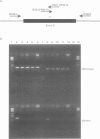Abstract
Deficiency of iduronate-2-sulphatase (IDS) results in the X linked recessive lysosomal storage disorder Hunter syndrome. Determination of carrier status in families affected by this disorder has been performed using a variety of enzymatic tests. None of these tests has proved to be 100% effective at identifying carriers. The aim of this study was to perform carrier testing in a family affected by the disorder, where testing was complicated by the fact that no surviving affected subjects were available for study. Direct dye primer sequencing of PCR products was used to identify mixed bases in an obligate carrier. Two mixed bases were observed within exon VIII. The first base change (T-->A) at nucleotide position 1150 results in a missense mutation (H342Q), while the second base change (G-->T) at nucleotide position 1151 results in a nonsense mutation (G343X). Four additional female family members were screened for the same mutation. Using this approach it is possible to provide unambiguous information about a subject's carrier status and, unlike biochemical testing, this approach will be equally effective when applied to families with the mild form of this disorder.
Full text
PDF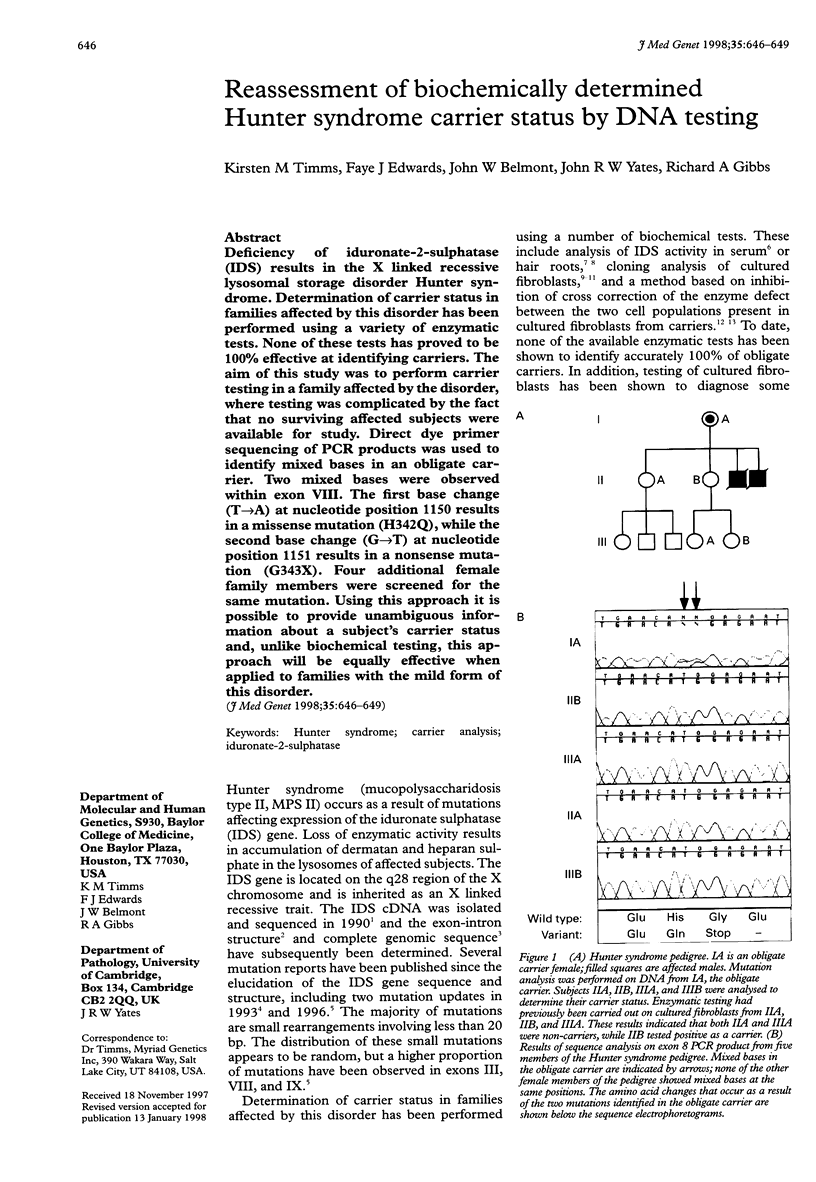
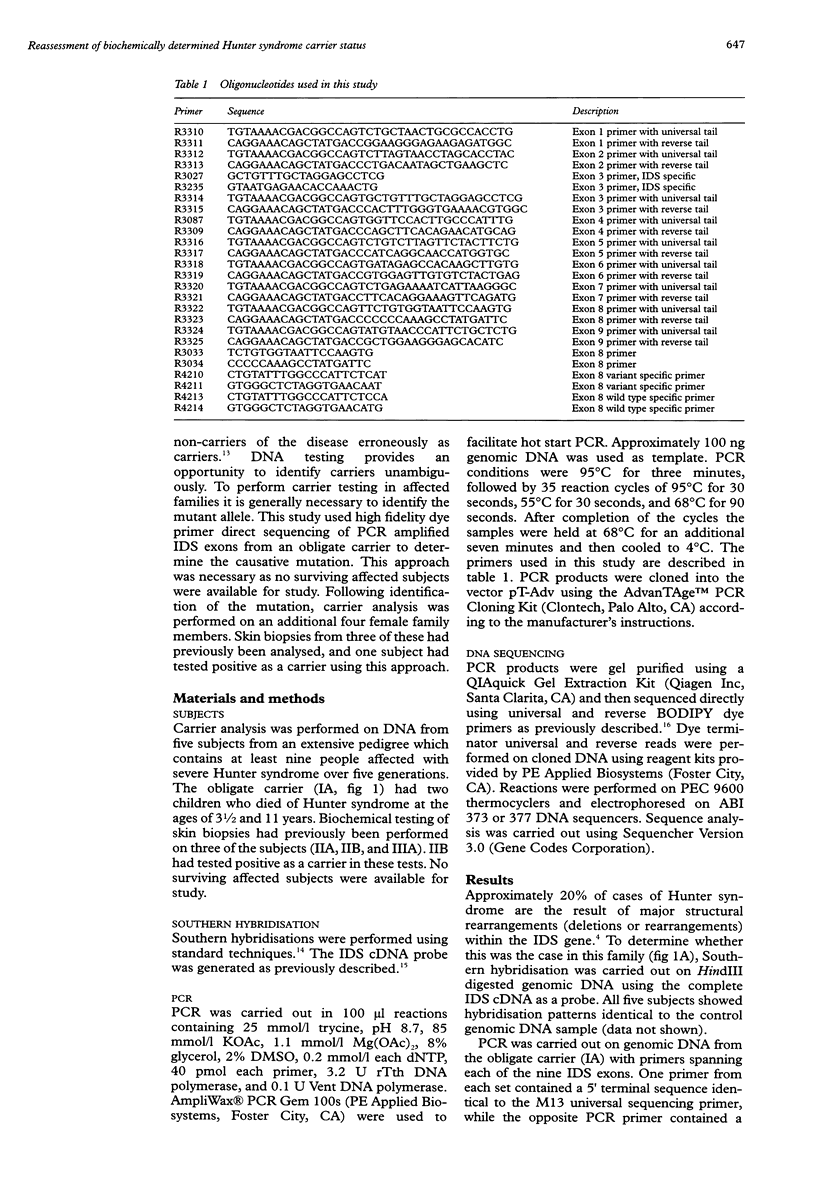
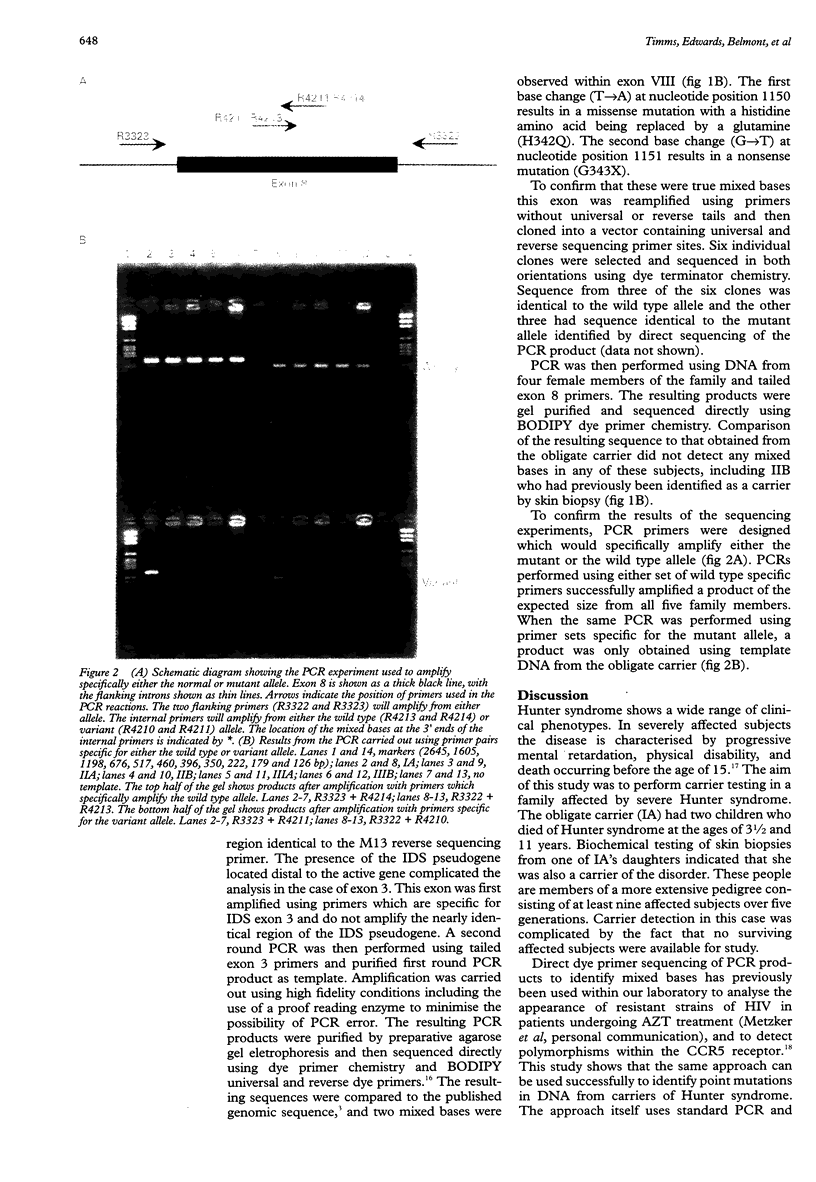
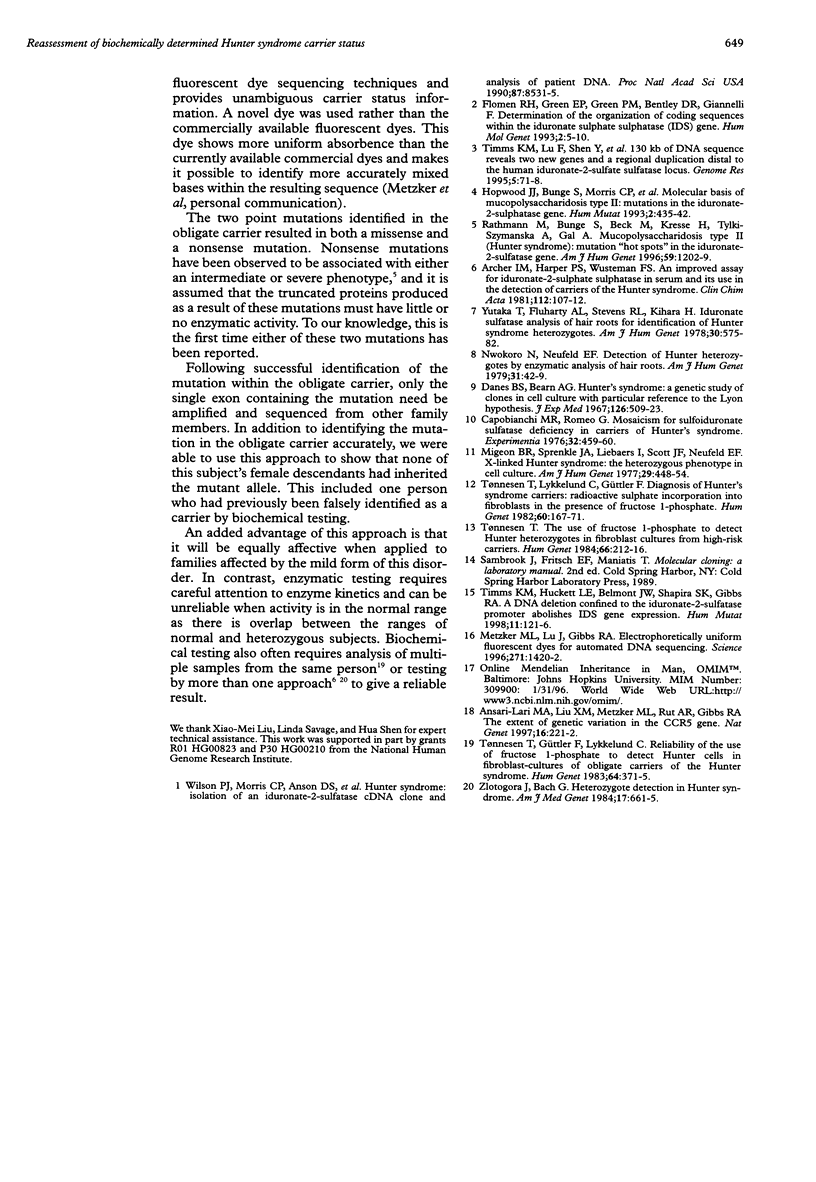
Images in this article
Selected References
These references are in PubMed. This may not be the complete list of references from this article.
- Ansari-Lari M. A., Liu X. M., Metzker M. L., Rut A. R., Gibbs R. A. The extent of genetic variation in the CCR5 gene. Nat Genet. 1997 Jul;16(3):221–222. doi: 10.1038/ng0797-221. [DOI] [PubMed] [Google Scholar]
- Archer I. M., Harper P. S., Wusteman F. S. An improved assay for iduronate 2-sulphate sulphatase in serum and its use in the detection of carriers of the Hunter syndrome. Clin Chim Acta. 1981 Apr 27;112(1):107–112. doi: 10.1016/0009-8981(81)90274-6. [DOI] [PubMed] [Google Scholar]
- Capobianchi M. R., Romeo G. Mosaicism for sulfoiduronate sulfatase deficiency in carriers of Hunter's syndrome. Experientia. 1976 Apr 15;32(4):459–460. doi: 10.1007/BF01920795. [DOI] [PubMed] [Google Scholar]
- Danes B. S., Bearn A. G. Hurler's syndrome: a genetic study of clones in cell culture with particular reference to the Lyon hypothesis. J Exp Med. 1967 Sep 1;126(3):509–522. doi: 10.1084/jem.126.3.509. [DOI] [PMC free article] [PubMed] [Google Scholar]
- Flomen R. H., Green E. P., Green P. M., Bentley D. R., Giannelli F. Determination of the organisation of coding sequences within the iduronate sulphate sulphatase (IDS) gene. Hum Mol Genet. 1993 Jan;2(1):5–10. doi: 10.1093/hmg/2.1.5. [DOI] [PubMed] [Google Scholar]
- Hopwood J. J., Bunge S., Morris C. P., Wilson P. J., Steglich C., Beck M., Schwinger E., Gal A. Molecular basis of mucopolysaccharidosis type II: mutations in the iduronate-2-sulphatase gene. Hum Mutat. 1993;2(6):435–442. doi: 10.1002/humu.1380020603. [DOI] [PubMed] [Google Scholar]
- Metzker M. L., Lu J., Gibbs R. A. Electrophoretically uniform fluorescent dyes for automated DNA sequencing. Science. 1996 Mar 8;271(5254):1420–1422. doi: 10.1126/science.271.5254.1420. [DOI] [PubMed] [Google Scholar]
- Migeon B. R., Sprenkle J. A., Liebaers I., Scott J. F., Neufeld E. F. X-linked Hunter syndrome: the heterozygous phenotype in cell culture. Am J Hum Genet. 1977 Sep;29(5):448–454. [PMC free article] [PubMed] [Google Scholar]
- Nwokoro N., Neufeld E. F. Detection of hunter heterozygotes by enzymatic analysis of hair roots. Am J Hum Genet. 1979 Jan;31(1):42–49. [PMC free article] [PubMed] [Google Scholar]
- Rathmann M., Bunge S., Beck M., Kresse H., Tylki-Szymanska A., Gal A. Mucopolysaccharidosis type II (Hunter syndrome): mutation "hot spots" in the iduronate-2-sulfatase gene. Am J Hum Genet. 1996 Dec;59(6):1202–1209. [PMC free article] [PubMed] [Google Scholar]
- Timms K. M., Huckett L. E., Belmont J. W., Shapira S. K., Gibbs R. A. DNA deletion confined to the iduronate-2-sulfatase promoter abolishes IDS gene expression. Hum Mutat. 1998;11(2):121–126. doi: 10.1002/(SICI)1098-1004(1998)11:2<121::AID-HUMU4>3.0.CO;2-M. [DOI] [PubMed] [Google Scholar]
- Timms K. M., Lu F., Shen Y., Pierson C. A., Muzny D. M., Gu Y., Nelson D. L., Gibbs R. A. 130 kb of DNA sequence reveals two new genes and a regional duplication distal to the human iduronate-2-sulfate sulfatase locus. Genome Res. 1995 Aug;5(1):71–78. doi: 10.1101/gr.5.1.71. [DOI] [PubMed] [Google Scholar]
- Tønnesen T., Güttler F., Lykkelund C. Reliability of the use of fructose 1-phosphate to detect Hunter cells in fibroblast-cultures of obligate carriers of the Hunter syndrome. Hum Genet. 1983;64(4):371–375. doi: 10.1007/BF00292369. [DOI] [PubMed] [Google Scholar]
- Tønnesen T., Lykkelund C., Güttler F. Diagnosis of Hunter's syndrome carriers; radioactive sulphate incorporation into fibroblasts in the presence or fructose 1-phosphate. Hum Genet. 1982;60(2):167–171. doi: 10.1007/BF00569706. [DOI] [PubMed] [Google Scholar]
- Tønnesen T. The use of fructose 1-phosphate to detect Hunter heterozygotes in fibroblast cultures from high-risk carriers. Hum Genet. 1984;66(2-3):212–216. doi: 10.1007/BF00286603. [DOI] [PubMed] [Google Scholar]
- Wilson P. J., Morris C. P., Anson D. S., Occhiodoro T., Bielicki J., Clements P. R., Hopwood J. J. Hunter syndrome: isolation of an iduronate-2-sulfatase cDNA clone and analysis of patient DNA. Proc Natl Acad Sci U S A. 1990 Nov;87(21):8531–8535. doi: 10.1073/pnas.87.21.8531. [DOI] [PMC free article] [PubMed] [Google Scholar]
- Yutaka T., Fluharty A. L., Stevens R. L., Kihara H. Iduronate sulfatase analysis of hair roots for identification of Hunter syndrome heterozygotes. Am J Hum Genet. 1978 Nov;30(6):575–582. [PMC free article] [PubMed] [Google Scholar]
- Zlotogora J., Bach G. Heterozygote detection in Hunter syndrome. Am J Med Genet. 1984 Mar;17(3):661–665. doi: 10.1002/ajmg.1320170317. [DOI] [PubMed] [Google Scholar]



